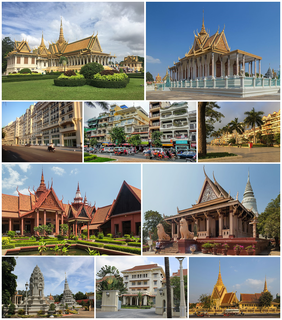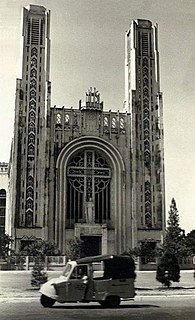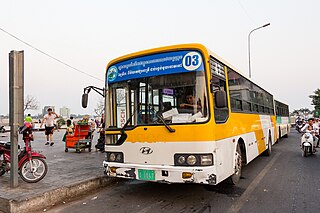
The system of Transport in Cambodia, rudimentary at the best of times, was severely damaged in the chaos that engulfed the nation in the latter half of the 20th century. The country's weak transport infrastructure hindered emergency relief efforts, exacerbating the logistical issues of procurement of supplies in general and their distribution. Cambodia received Soviet technical assistance and equipment to support the maintenance of the transportation network.
Transportation in Lebanon varies greatly in quality from the ultramodern Beirut International Airport to poor road conditions in many parts of the country. The Lebanese civil war between 1975 and 1990 and the 2006 Lebanon War with Israel severely damaged the country's infrastructure.

Phnom Penh is the capital and most populous city of Cambodia. It has been the national capital since the French protectorate of Cambodia, and has grown to become the nation's economic, industrial, and cultural centre.
Articles related to Cambodia and Cambodian culture include:

Kandal is a province (khaet) of Cambodia located in the southeast portion of the country. It completely surrounds the Cambodian capital of Phnom Penh and borders the provinces of Kampong Speu and Takeo to the west, Kampong Chhnang and Kampong Cham to the north, Prey Veng to the east, and shares an international border with Vietnam to the south. It is the second most populous province in Cambodia after the capital Phnom Penh. Its capital and largest city is Ta Khmao, which is approximately 8 km south of central Phnom Penh. Kandal is one of the wealthier provinces in the country.

Phnom Penh International Airport is the busiest and largest airport in Cambodia, occupying a land area of 386.5 hectares. It is located in the Pou Senchey District, 10 kilometres (5.4 NM) west of Phnom Penh, the nation's capital.

Siem Reap International Airport is an international airport serving Siem Reap, a popular tourist destination due to nearby Angkor Wat. It is the second busiest airport in Cambodia after Phnom Penh International Airport.

A motorcycle taxi, or cart bike or bike taxi, is a licensed form of transport in some countries. The taxi typically carries one passenger, who "rides pillion" behind the motorcycle operator. Multiple passengers are common in some countries.

Siem Reap is the second largest city of Cambodia, as well as the capital and largest city of Siem Reap Province in northwestern Cambodia.

The following is a list of transportation in San Diego County, California.

Mean Chey is an administrative district (khan) located in the south-eastern part of Phnom Penh, Cambodia. As of 2019, due to boundary changes, its population decreased from 2008 but is the second most populous district of Phnom Penh.

Cambodia has 612 km (380 mi) of 1,000 mm metre gauge rail network, consisting of two lines: one from the capital Phnom Penh to Sihanoukville, and another from Phnom Penh to Poipet on the Thai border. The lines were originally constructed during the time when the country was part of French Indochina, but due to neglect and damage from civil war during the latter half of the 20th century, the railways were in a dilapidated state and all services had been suspended by 2009. Through rehabilitation efforts by the Government of Cambodia, with funding from the Asian Development Bank, Australian Agency for International Development (AusAID) and Australian company Toll Holdings, freight and limited passenger service returned between Phnom Penh and Sihanoukville by 2016, and passenger service between Phnom Penh and Poipet was fully restored in 2019.

Sihanoukville Province is a province (khaet) in Southwest Cambodia on the Gulf of Thailand. The provincial capital, also called Sihanoukville, is a deep water port city and a steadily growing and diversifying urban center on an elevated peninsula.

Kep Province is the smallest province (khaet) of Cambodia covering 336 km2 (130 sq mi), with a population of 41,798. It is one of the newest Cambodian provinces, together with Pailin, Sihanoukville and Tboung Khmum, created by Royal Decree on 22 December 2008, which separated Kep Municipality & Damnak Chang'aeur District from the Kampot Province, as well as adjusting several provincial borders. It is both the smallest and least populous province of Cambodia. The provincial capital is Kep District and the province contains the Kep National Park.

Notre Dame Cathedral, also known as the Cathedral of Phnom Penh, was a 19th-century French Gothic revival church that served as the cathedral of the Apostolic Vicariate of Phnom Penh. It was located in the Russei Keo District of the city on Monivong Boulevard.
The Fall of Phnom Penh was the capture of Phnom Penh, the capital of the Khmer Republic, by the Khmer Rouge on 17 April 1975, effectively ending the Cambodian Civil War. At the beginning of April 1975, Phnom Penh, one of the last remaining strongholds of the Khmer Republic, was surrounded by the Khmer Rouge and totally dependent on aerial resupply through Pochentong Airport.

Sihanoukville, also known as Kampong Som is a coastal city in Cambodia and the capital of Sihanoukville Province, at the tip of an elevated peninsula in the country's south-west on the Gulf of Thailand. The city is flanked by an almost uninterrupted string of beaches along its entire coastline and coastal marshlands bordering the Ream National Park in the east. The city has one navigable river, the mangrove lined Ou Trojak Jet running from Otres Pagoda to the sea at Otres. A number of thinly inhabited islands – under Sihanoukville's administration – are near the city, where in recent years moderate development has helped to attract a sizable portion of Asia's individual travelers, students, and backpackers.

The Phnom Penh City Bus is a municipal public transport system that serves Phnom Penh, the capital of Cambodia. The system opened to the public in September 2014 with 3 lines, other lines have been gradually added over the next several years. As of 2020, 17 lines run throughout the city. The system covers Prek Pnov (North), Ta Khmao (South), Chbar Ampov (East), and Special Economic Zone (West), there are plans to stretch the network outward.

The Phnom Penh International Airport station is a station on Line 03 of the Phnom Penh BRT bus rapid transit network in Phnom Penh, Cambodia, located on the Russian Confederation Boulevard. It is located outside of Phnom Penh International Airport.
The Ho Chi Minh City–Phnom Penh railway is a proposed railway between Ho Chi Minh City, Vietnam and Phnom Penh, Cambodia. The railway is envisioned to complete the missing link on the eastern line of the Kunming–Singapore railway.

















